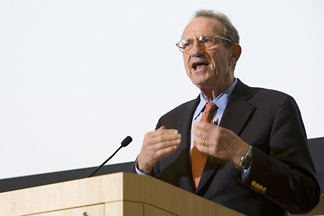Growing U.S. awareness of its fragile petroleum supply is hopeful sign, panelists at energy conference agree
By Sara Ball

The world is running out of oil but we are continually increasing our dependence on it, said John Deutch, former director of the Central Intelligence Agency and now a professor at the Massachusetts Institute of Technology (MIT), speaking at the "Challenges of Energy in the 21st Century" symposium, held in Alice Statler Auditorium Oct. 28.
Americans, Deutch said, want an energy policy that is quick, cheap and easy to implement. "Americans are right about [wanting] that," he said. "But we have to balance these hopes against certain realities."
Those realities include the inextricable link between domestic policy and international affairs. U.S. imports of crude oil averaged 10.5 million barrels a day in August, with the supply highly dependent on countries like Saudi Arabia, Venezuela and Nigeria. "We have to ensure stable governments because we're continuing to depend on their ability to keep supplying us with oil," Deutch said.
Another reality is that developing nations such as China, India and Indonesia are rapidly increasing their consumption of oil. At the same time, suppliers such as Russia and Venezuela, said Deutch, use their oil supplies as international political leverage. Furthermore, developing nations lack the motivation to help solve a pollution and energy crisis that industrialized nations created, he explained.
"Global warming is as important as foreign policy because the interests of industrialized countries are exactly the opposite of the interests of developing countries," Deutch said.
Some good news is that America is starting to realize its need to become a less petroleum-dependent economy. "Five years ago, hardly anyone was talking about energy. Look how quickly in five years the whole dialogue of this country has come," said Daniel Nocera, the W.M. Keck Professor of Energy and professor of chemistry at MIT and symposium panelist. Also on the panel were Kenneth Deffeyes of Princeton University and David Pimentel, Cornell entomology professor emeritus.
But attention to energy issues has been sporadic. Cycles of attention closely parallel cycles of energy prices, rising and falling together, noted Deutch. "The U.S. has not developed the sustained level of attention necessary to make progress. This will cause future generations to suffer," he said. Deutch suggested changing the way we think of ourselves as a consuming country and start becoming a country that can produce more of its own energy supplies.
"I'm for $10 a gallon gasoline," he said. A high tariff on gasoline would encourage conservation and allow new technologies to enter the market at reasonable equivalent costs, he reasoned. "But no political figure today will support that policy."
Global warming from the effects of greenhouse gases, such as carbon dioxide, engaged the panelists, who discussed flaws in the Kyoto Treaty and potential solutions, such as a carbon dioxide trading system or sequestration -- burying it in the ground. But these solutions ignore the need for conservation and collaboration, panelists agreed.
Collaboration is also vital in successful energy research, the panelists noted. "We need to have scientists, engineers and economists all working together," Deutch said. Fortunately, he said, universities and large energy companies are showing "tremendous interest" in doing research.
Deutch suggested that the United States needs both a short-term and a long-term plan. And although nothing will happen overnight, he emphasized, the choices we make today will affect the choices available to us in the future.
Sara Ball is a writer intern with the Cornell Chronicle.
Media Contact
Get Cornell news delivered right to your inbox.
Subscribe